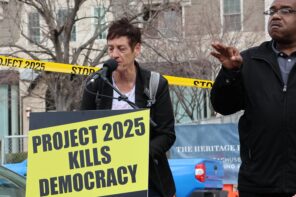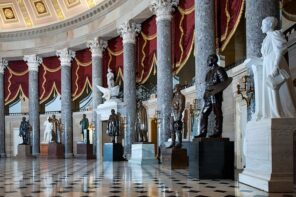The New York Times reports that Jessica Manning, a voter at a campaign stop in Knoxville, Iowa, asked Hillary Clinton how she could defend her choice to vote for the Democratic frontrunner to her Republican friends. “I would say I am a Democrat because of my Christian values, but many of my friends would say they are Republicans because of their Christian values,” Manning told Clinton. “So in these next few months as I am supporting you and defending you to my Republican friends, I am just curious, how you would say your beliefs align with the Ten Commandments and is that something that’s important to you?”
Clinton then embarked on a lengthy answer about her Methodist faith, which began with this statement: “Thank you for asking that. I am a person of faith. I am a Christian. I am a Methodist. I have been raised Methodist.”
The Times describes this as “a rare opportunity to speak at length about her views on Christianity and the Bible.” But the truth is Clinton has never been shy about talking about her Methodism. In the 2016 cycle, though, she has not talked much at all about her religion, leaving that task to surrogates, as I reported last year:
Burns Strider, a political strategist who directed Clinton’s faith outreach for her 2008 presidential campaign and in 2014 founded the super PAC Faith Voters for Hillary, predicted that Democratic outreach, whether through the Democratic National Committee or individual campaigns, will be more about mobilizing progressive religious voters than trying to court moderate or conservative voters away from the Republican Party.
Strider, who now is the executive vice president of American Bridge, a Democratic super PAC and a senior adviser to its pro-Clinton project Correct the Record, recently wrote for the Religion News Service about his admiration for Clinton’s faith and how he has “loved every second of getting to know this woman with such strong Midwest, Methodist sensibilities.”
Faith Voters for Hillary tweets quotes from Clinton that promote this view of her faith. Quoting her remarks at a 2007 forum on faith for Democratic presidential candidates, the group highlighted that she prays daily “for discernment, for wisdom, for strength, for courage.” Another tweeted quote was from a 2007 Clinton campaign speech at an Iowa church, where she said, “Work without faith is very hard. Faith keeps you going, keeps you moored to your values.”
There is a lot to like in Clinton’s answer yesterday, including her discussion of a Christianity that is “more open, tolerant and respectful” and her dismay “that Christianity, which has such great love at its core, is sometimes used to condemn so quickly and judge so harshly.”
But there is another element here that Clinton failed to address: secularism in politics and government. Manning asked her specifically about “how your beliefs align with the Ten Commandments and is that something that’s important to you?” Clinton’s answer was about her own faith, and her own disappointment that some who share her faith tradition don’t share her open-minded and open-hearted view of it.
That seems like an obvious way to answer Manning’s question, which was framed as a partisan divide. But there was another way to contrast these two strands of Christianity: through the prism of politics rather than religion. Clinton could have said, “I am a Christian, a Methodist, but you know the Constitution prohibits religious tests for the presidency. I believe strongly in protecting the religious freedom of all Americans, as guaranteed by the Constitution.” Or she could have said, “I am a Christian, a Methodist, and while like every religious person my views of the Bible are important to me personally, our Constitution guarantees a secular government, and I believe our law and public policy should not be based on any particular religious view.”
So perhaps there were two opportunities in Knoxville yesterday: a rare opportunity and a missed opportunity.




